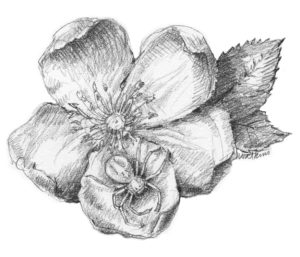Through the Garden Gate
April, Tolerance, Empathy and Kindness
By Leslie Watkins
As with most of our life choices, our gardens reflect who we are and what is important to us. Gardens can be characterized as welcoming, natural, fussy or formal. They can be simple or complex, secluded or openly accessible. Caring for your garden may be casual, high maintenance, frenetic, routine or occasional. Your garden design may be carefully planned, heavily researched or spontaneous. The results of your efforts can be discouraging, overwhelming, exhausting or nurturing, healthful and productive. Ideally, gardening is time spent filled with pleasure and joy.
It is possible to improve our characters through practice. For example, changing our posture affects our confidence. Breath control alters our emotions. We can affect ourselves internally by changing how we act externally and vice versa. And perhaps we can be better people by being better gardeners.
Tolerance is the willingness to be fair and objective about accepting something, in particular the existence of opinions or behavior that you do not necessarily agree with. Tolerant gardeners accept the presence of things they may not be comfortable with. Allowing a spider to take up residence in a rose may result in high-quality pest control. That scrap of wood left on the ground could provide cover for centipedes who feed on slugs. A plant may spread itself around by seeds or runners. In the process it could grow in a more perfect place than was planned. A mislabeled plant could bloom an unexpected color, but it works anyway—maybe even better. Nature can reveal new plant combinations and spark ideas. Gardening helps you to grow when you learn to accept that not everything is under your control. Being curious to see how things unfold can make for exciting results and amusing bloopers. It may not be your idea of perfection, but it could be interesting and present previously unthought-of possibilities.
Empathy is the ability to understand the feelings or needs of another. By studying, observing and understanding what is happening in your garden you can greatly improve the likelihood of your success. Creating a win-win situation could be planting resilient native shrubs that provide birds and insects with food and shelter. With our wild workforce of little pollinators we can increase the yield of vegetables, fruits and flowers. In some cases you can leave the pest control to Mother Nature. If you are patient and willing to sacrifice some leaves, fruit or flowers, predators will arrive to do their job. Plants have the capacity to send out SOS signals to beneficial insects. Sharp-eyed birds will patrol the garden diligently while you in turn enjoy watching them.
Kindness is the quality of being friendly, generous and considerate. That includes being kind to yourself. Don’t bite off more than you can chew. Ease yourself gently into gardening—it’s a lifetime pursuit. Be smart about your capabilities and priorities. Sharing your garden with friends is one of the most satisfying things you can do. Having a nice place to sit and enjoy all of nature’s sights, sounds, scents and tastes may be the greatest gift Earth has to give us. Be kind to our precious planet by being aware of the consequences of your actions. It has never been more important than it is now. Pay it forward to future generations of plants, animals and people by considering more sustainable and healthier options for your lifestyle.
Studies show that we can train ourselves to develop new behaviors and habits through repetition in as little time as 28 days. Let’s practice more tolerant, empathetic and kinder natures in the garden and see how far afield the effects will spread.
April Chore Checklist
Start cleaning up sticks and debris.
Trim away broken branches and battered leaves.
Remove viburnum leaf beetle nests and burn them.
Prune grape vines, raspberries and gooseberries.
Turn the compost pile.
Avoid walking on muddy soil.
Take down and clean bird feeders well.
Put out clean birdhouses and birdbath.
Sow seeds indoors for tomatoes, peppers and basil.
Outdoors, plant peas, spinach and kale.

